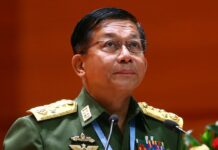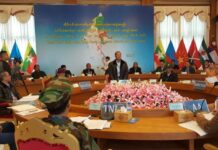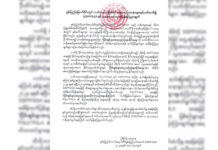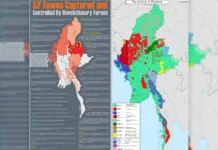With the Law Khee Lar Summit Meeting of Ethnic Armed Organizations (EAOs)’ leaders, from 2 to 9 June, coming to an end, the question arises whether the much awaited Nationwide Ceasefire Agreement (NCA) could be signed according to the liking and timing of Thein Sein regime anytime soon.

Law Khee Lar Meeting has come up with the resolution of all-inclusive signing of the NCA; amendment of the 5th NCA Draft of 31 March; and formation of a new negotiation team to replace the old Nationwide Ceasefire Coordination Team (NCCT).
The regime is said to be pegged to the acceptance of its 16 EAOs that have signed ceasefire, except for the Kachin Independence Army (KIA) that has not signed but taken as a negotiation partner.
The EAOs leadership, on the other hand, wouldn’t budge from insisting that all of its 16 NCCT members must be included in the NCA ratification, of which three, Myanmar National Democratic Alliance Army (MNDAA), also known as Kokang group, Ta’ang National Liberation Army (TNLA), and Arakan Army (AA), are rejected and not recognized as negotiation partners by the government.
According to DVB, on 8 June, Min Zaw Oo of Myanmar Peace Center (MPC) said, it would be hard to accept the said three EAOs, for from the regime’s point of view, they are newly formed groups; and especially the MNDAA for getting stronger starting 2012 by militarily beefing up its forces. The government might think it is being pressured by military means to be accepted as negotiation partner. He said, as the government still adheres to its 16 designated EAOs, if groups like Kokang will participate, it is going to be difficult to proceed.
Another point is the alteration of NCA by the EAOs, which means there would be more discussions and negotiations that the government could ill afford, for time is running out, with the national elections approaching fast and scheduled to be held in November.
It is clear that the regime wants to cash in by signing the NCA as soon as possible, which would make the regime’s party looks good during the election campaigns and also benefits from international humanitarian and development aid programs, promised by the donors, once the NCA is signed. The UN special representative Vijay Nambiar was delivering exactly this kind of message, when he urged the conference participants to sign the NCA, so that aids could be channeled. If the signing is delayed, the UN might reconsider its affirmative position, he said.
Then there is a pressing issue on disarmament, demobilization, and reintegration (DDR) and security sector reform (SSR). The regime, or better the military, prefers DDR, which the EAOs consider to be “negotiated surrender”, while the EAOs are for SSR, which the military believes to be destroying its Burman-dominated military apparatus, by integrating the ethnic armed forces into the Burma Army on equal status.
On top of that, the new EAOs negotiation team, which is to be the counterpart of Union Peace-making Work Committee (UPWC), is made up of a more hawkish individuals that won’t give in easily to the regime’s pressure. Naw Zipporah Sein, who would head the newly formed team, has often been at odds with the Karen National Union (KNU) Chairman Mutu Say Poe for his regime’s friendly policy posture and implementation.
Under such circumstances, it is hard to imagine that the future negotiations, if there is going to be any, between the EAOs and the regime will be a smooth one, given so much disagreement and differing positions on how to go about to achieve a compromised, desired outcomes, that all could identify and be happy with.
The contributor is ex-General Secretary of the dormant Shan Democratic Union (SDU) — Editor
















Leave a Comments